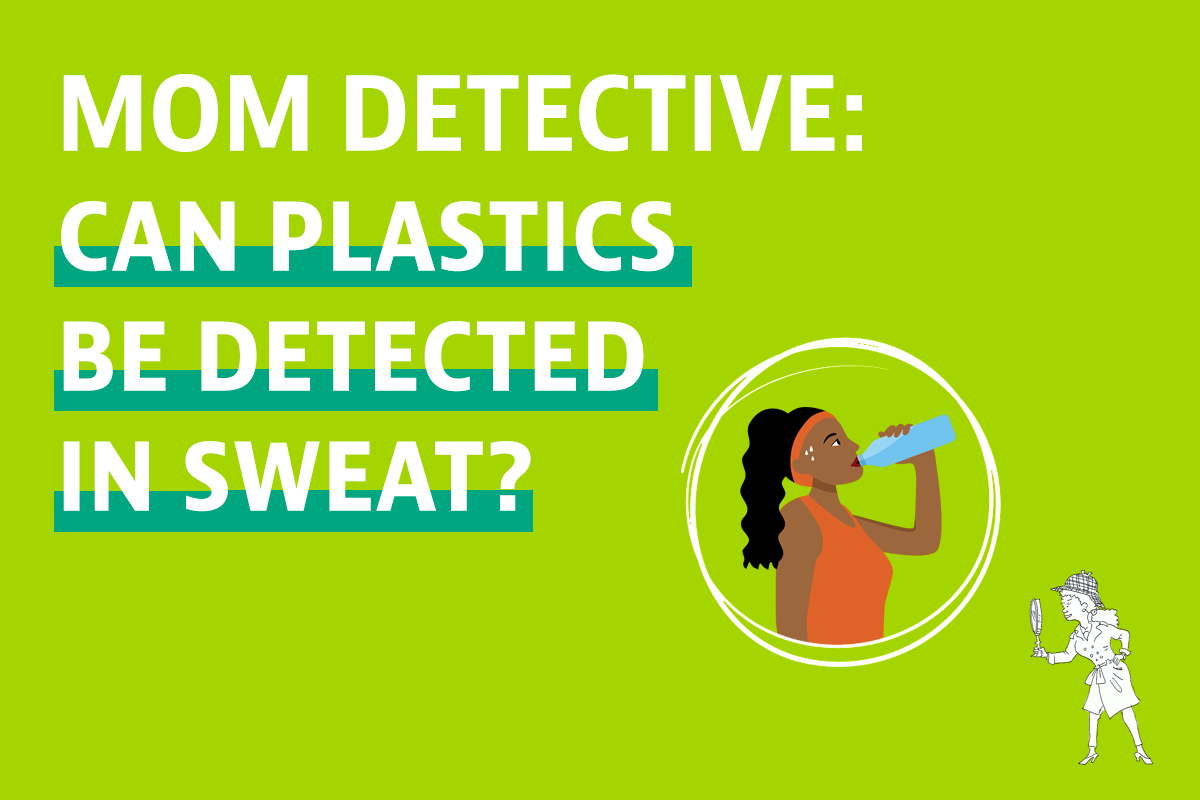
Written by Amy Ziff

QUESTIONS: From Michael, Southfield, MI: Is it possible to have microplastics in your sweat? Can a person consume too many microplastics?
MOM DETECTIVE ANSWER: Thank you, Michael, for your inquiry.
Plastics are relatively new to the world. These chemicals have only existed for a little over 100 years, and while they are proliferating, we are learning about how they behave in our bodies and the environment. Given that plastics are widely used across the globe—with insufficient research—we now have to deal with the mess they have created in real time. Alas, the science on plastics is playing catch-up to the reality of the use and disposal. That leaves us lacking definitive answers. But there’s still a lot we do know.
What we know about plastics:
We know plastics are persistent, as they do not break down in the environment, and stay in the human body for very long periods of time. In fact, the average plastic debris will outlive you and I combined.
According to the Center for International Environmental Plastics Law (CIEL), whether ingested or inhaled, plastics are associated with inflammation, genotoxicity, oxidative stress, apoptosis, and necrosis in the human body. Each of these, according to CIEL are linked to a number of negative health outcomes and/or diseases including cancer, cardiovascular diseases, inflammatory bowel disease, diabetes, rheumatoid arthritis, auto-immune conditions, neuro-degenerative diseases, and stroke.
We also know that micro- and nano-plastics are not just problematic for humans, as plastic particles have been found in the bodies of animals and fish. Studies analyzing how micro- and nano-plastics impact the health of marine life revealed that plastic particles were affecting biological functions in fish. Their behavior and neurological functions, as well as their metabolism, intestinal permeability, and intestinal microbiome diversity, were altered.
Now, this does not mean that humans are impacted in the same exact way as fish. And since fish don’t sweat, we don’t know if they are able to excrete these particles.
Plastics have been found in the lungs, sweat and other parts of the body.
I’ve written about the issue of plastic pollution in regards to micro-sized, invisible pieces of plastic detected in air, water and also food. Recently, a study showed plastics in human lungs, and somewhat surprisingly, plastics were also found deeply embedded in lower regions of the body. Plastic is also found in our poop and urine. Another scientific study that attempted to evaluate the harm of plastics in humans cited that most plastic from food sources will pass through your gut and get excreted.
If plastic is not ingested and comes through the air—then what is the body’s mechanism for removal?
This study offers proof that at least one form of plastic—Bisphenol commonly known as BPA—is found in human sweat. That indicates that at least some plastics do find a way out. But it still leaves us with questions: Do all plastics get sweated out? And once these tiny particles are embedded, what happens if you don’t sweat or excrete them thoroughly?
There’s still a lot to learn about how plastics affect human health.
Personally, I don’t like the idea of synthetic particulates entering my body, blood, and organs. But more study is required to “definitively know” how much plastic is harmful for humans.
As with many toxic chemicals in our products, the issue is often that scientists are unable to test on humans…at least not officially. By virtue of living in the modern age, I could argue that we are all lab rats in an uncontrolled experiment because chemicals are made and deployed into the marketplace without sufficient research and regulation.
The unfortunate implications of this are that we live with these chemicals until there’s a calamity and undoubtable proof of harm. Then, if we’re lucky, our regulatory system kicks into action. And that is a painstakingly slow process that is often hampered by messy complicated and controversial politics, as the chemical industry—with a financial stake in keeping these chemicals on the market—lobbies heavily against regulation.
What can we do to lessen our exposure to plastic?
At this time, there’s no way for any of us to completely avoid plastics. So, anyone who wonders what plastic particles are doing to them, and what amount of plastics are acceptable—can rethink their plastic usage and how to avoid them. Here are a few suggestions:
- Take a look how you receive food—what it’s stored in, what you cook in and what you use for preparation.
- Stop using single-use plastics.
- Write your elected officials and demand the elimination of single-use plastics and the reduction of, collection requirements, and regulation around all plastic uses to be enacted everywhere.
TELL THE EPA: STOP THE CHEMICAL INDUSTRY'S ATTEMPTS TO CRIPPLE OUR TOXICS LAW
Did you find this post useful? Let us know by pinning us!
